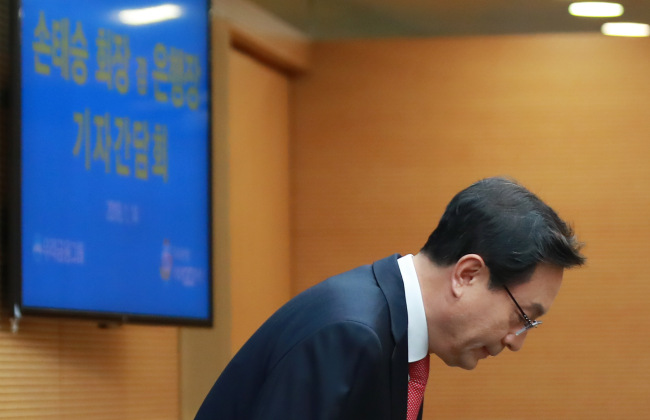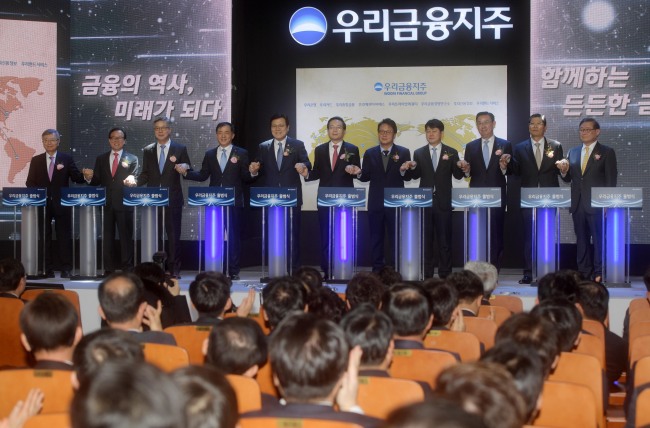Deals
Woori Financial poised for M&A binge
[THE INVESTOR] Woori Financial Group wrote several pages of Korea’s financial history when it became the first banking group in the country to have a holding company structure.
The process, however, wasn’t done voluntarily, as it was created by putting together five commercial banks that had to be injected with government funds in the aftermath of the 1997 Asian financial crisis.
The modern day structure was the result of a whole bunch of sell-offs by state-owned Korea Deposit Insurance Corp., the largest stakeholder, leaving Woori Bank at the pinnacle of the financial group without a holding company.
This month, the banking group revived the holding company structure, and Woori Bank will officially be renamed Woori Financial Group in February.
 |
Woori Financial Group Chairman and Woori Bank CEO Sohn Tae-seung |
The group’s new Chairman Sohn Tae-Seung is hoping to stabilize the new structure by focusing more on non-banking financial businesses and diluting the dominance of Woori Bank. As a key strategy, he is likely to go on an M&A binge, but it’s going to be a challenge due to lingering regulatory restrictions, according to market watchers.
Not enough liquidity
The financial group’s liquidity including its leverage ceiling is roughly estimated at some 6.4 trillion won (US$5.71 billion), based on Woori Bank’s consolidated financial statement as of September.
Under the Korean law, a banking group with a holding company structure can spend up to 130 percent of the equity capital to invest in affiliates and subsidiaries. Financial groups without a holding company structure are allowed to spend only up to 20 percent of the equity capital. The bottom line is that the group now has more capital for investment, some of which is likely to be used to add existing Woori affiliates to the holding company.
Despite the upside, industry watchers say it’s unlikely that Woori will have much bigger access to capital because financial authorities have ordered the holding company to adopt tougher guidelines in assessing its credit risk and financial health in the first year of operations as suggested in the Basel II accord.
M&As could weigh on Woori’s capital adequacy ratio, so there is not much room for such deals, according to Choi Chung-uk, an analyst at Daishin Securities.
“It won’t be easy, especially in the first year,” he said. “New regulations on banks for sectoral countercyclical capital buffers for households will be a further burden.”
Bulking up with M&As
With limited levearge, the new Woori chairman appeared ready to take advantage of the fresh funds. Sohn has already said that the group is looking to acquire either a non-banking lender, a real estate investment trust or an asset management firm.
 |
Participants celebrate the launch of Woori Financial Group on Jan. 14. |
Related:
More investment to the startups: Woori group chairman
One likely candidate is Aju Capital, a private financing company that wholly owns a savings bank. Woori has invested some 100 billion won in a private equity fund that owns controlling stake in Aju. Woori has also invested in a fund operated by Well to Sea Investment, which holds a 74.03 percent in Aju.
Through the change in ownership, Aju was able to improve its credit rating and issue more corporate bonds -- three times more -- in the first half of 2018. Aju’s capital reached 6 trillion won as of end-September, according to its consolidated financial statement.
Speculations abound that Woori would also likely ride the momentum in the local REIT industry. In 2017, the combined net profit of 11 REITs rose 28.3 percent on-year and jumped over fourfold in four years, according to data by the Financial Supervisory Service.
Among them, Kukje Trust has emerged as the top pick, as it is one of the three REITs whose major shareholders are individuals and PEFs or corporate investors. Woori Bank already owns a 6.54 percent in Kukje Trust. Market watchers have put the value of the REIT at 250 billion won based on EBITDA multiple of seven times.
Other possible privately owned REITs are Mugunghwa Trust and Korea Trust, which are valued at 100 billion won and 150 billion won, respectively, with similar EBITDA multiples.
Among AMCs, Hi Asset Management and Hi Investment & Futures Corp., both currently under the umbrella of DGB Financial Group, are now up for sale. Combined, they are said to be roughly valued at 130 billion won.
While Sohn downplayed the possibility of acquiring brokerages or insurers, mainly due to the deal size, market watchers believe Woori may go down that path.
Lotte is selling off financial units such as non-bank financing firm Lotte Capital, credit card firm Lotte Card and damage insurer Lotte Non-life Insurance. Also, IT firm Sangsangin’s recent withdrawal from a bid to acquire a 41.84 percent stake worth 42 billion won in Golden Bridge Investment & Securities means that other firms, such as Woori, may have a shot.
By Son Ji-hyoung (consnow@heraldcorp.com)








